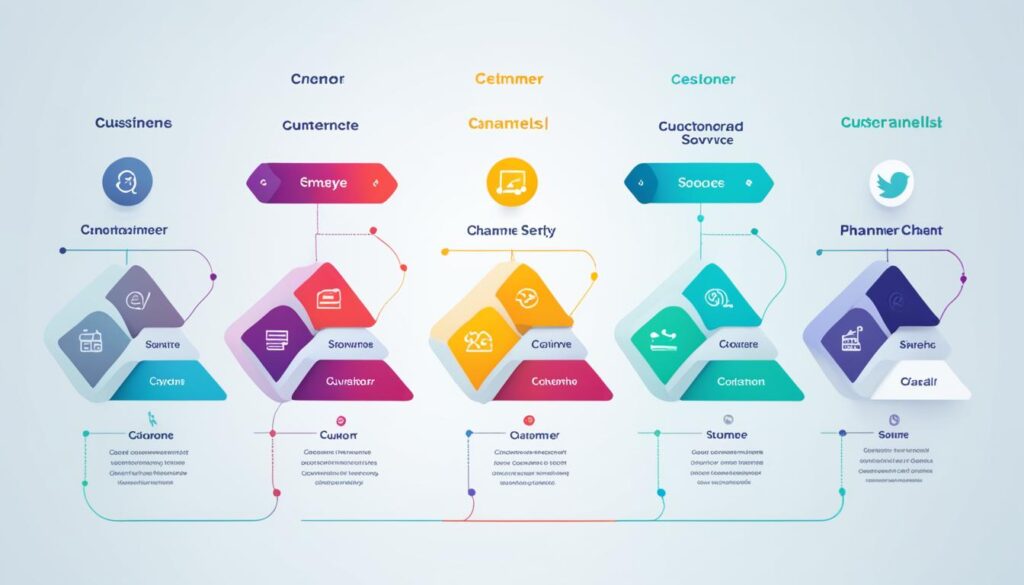Welcome to our guide on customer service! In this section, we will delve into the definition of customer service and its importance in today’s business landscape. Whether you’re a business owner, a customer service professional, or simply curious about how to boost client relations, understanding the fundamentals is key.
Customer service refers to the support and assistance given before, during, and after customers purchase a product or service. It encompasses a wide range of activities, including answering questions, resolving complaints, interacting with customers, and providing guidance. The goal of customer service excellence is to ensure that customers have a positive and seamless experience throughout their journey with your business.
Effective customer service can make a significant impact on your brand’s reputation and profitability. When customers receive exceptional service, they are more likely to become loyal advocates of your brand. On the other hand, poor customer service can drive customers away, leading to lost revenue and potential damage to your business’s reputation.
Key Takeaways:
- Customer service involves supporting customers before, during, and after their purchase.
- Excellent customer service enhances brand loyalty and boosts client relations.
- Providing subpar customer service can lead to customer dissatisfaction and loss of business.
Why Is Customer Service Important?
Customer service plays a crucial role in enhancing customer experience and building brand loyalty. When customers have a positive interaction with a company’s customer service representatives, it creates a lasting impression that can result in increased customer retention and repeat business.
A single bad customer interaction, on the other hand, can have significant repercussions. It can lead to customer dissatisfaction, negative word-of-mouth, and even the loss of potential customers to competitors. Therefore, providing excellent customer service should be a top priority for businesses looking to succeed in today’s competitive landscape.
By offering exceptional customer service, companies can:
- Improve brand loyalty: When customers have a positive experience with a company’s customer service team, they are more likely to develop an emotional connection to the brand. This loyalty can result in continued patronage, repeat purchases, and increased customer lifetime value.
- Retain existing customers: Effective customer service helps in retaining existing customers by resolving their concerns and issues promptly and satisfactorily. This not only prevents customer churn but also helps in building long-term relationships and fostering customer loyalty.
- Attract referrals: Satisfied customers become brand advocates and willingly recommend the company to their friends, family, and colleagues. Positive word-of-mouth referrals can bring in new customers, contributing to business growth.
- Increase customer lifetime value: When customers have a positive customer service experience, they are more likely to continue doing business with the company in the long run. This increases their lifetime value, as they make repeat purchases and potentially become loyal customers.
By prioritizing customer service support and ensuring each customer interaction is handled with care and professionalism, companies can build a strong reputation for providing excellent customer service. This reputation will not only help in retaining existing customers but also attract new customers who value outstanding customer support.
To illustrate the importance of customer service, consider the following example:
Example:
Julia is shopping for a new laptop online. She has narrowed down her options to two brands: Brand A and Brand B. Both brands offer similar features and prices. However, Julia remembers that a friend had a positive experience with Brand A’s customer service when she had an issue with her previous laptop. On the other hand, Julia has heard complaints from another friend about Brand B’s inefficient and unhelpful customer service. Based on this information, Julia decides to purchase her laptop from Brand A because she values good customer service and wants the assurance that any future issues will be resolved promptly and satisfactorily.
| Benefits of Customer Service | How it Helps |
|---|---|
| Improved Brand Loyalty |
Customers develop a stronger emotional connection to the brand, resulting in increased loyalty, repeat purchases, and higher customer lifetime value. |
| Increased Customer Retention |
Effective customer service resolves customer issues and concerns, preventing customer churn and fostering long-term relationships. |
| Referrals and Advocacy |
Satisfied customers become brand advocates and recommend the company to others, driving new customer acquisition. |
| Higher Customer Lifetime Value |
Positive customer service experiences lead to continued business, repeat purchases, and increased customer lifetime value. |
Key Components of Good Customer Service
Good customer service is characterized by several key components. To provide outstanding support, it is important to prioritize personalization, empathy, responsiveness, product knowledge, and professionalism.
1. Personalization: Treating customers as individuals and creating tailored experiences is essential to delivering good customer service. By understanding their unique needs and preferences, you can provide a personalized touch that enhances their experience and fosters loyalty.
2. Empathy: Demonstrating empathy means understanding and addressing customer pains and concerns. Empathizing with their emotions and actively listening to their issues helps build trust and establishes a positive rapport.
3. Responsiveness: Being prompt and efficient in handling customer issues is a vital aspect of good customer service. Customers expect quick resolutions and timely communication, so it is crucial to have streamlined processes in place to address their needs promptly.
4. Product Knowledge: Having in-depth knowledge about your products or services is essential for providing accurate information and assistance to customers. A comprehensive understanding of your offerings enables you to provide effective solutions and recommendations, instilling confidence in your customers.
5. Professionalism: Maintaining professionalism in all customer interactions is crucial. Being respectful, courteous, patient, and constructive when communicating with customers ensures a positive experience and helps build a professional reputation for your brand.
By incorporating these key components into your customer service practices, you can create a positive and memorable experience for your customers, fostering strong relationships and driving customer loyalty.

Types of Customer Service
When it comes to customer service, businesses have various channels through which they can provide support to their customers. Understanding and utilizing these different customer service channels can help you effectively meet the needs of your customers and enhance their overall experience with your brand.
Phone Support
Phone support is a traditional and widely used method of customer service. It allows customers to reach representatives via a designated phone number. This channel provides a direct and personal interaction, enabling customers to have real-time conversations with knowledgeable agents who can assist them with their inquiries, provide solutions to their problems, or address any concerns they may have.
Email Support
Email support is an efficient and organized way for customers to share their issues with your support team. By emailing their concerns or questions, customers have the convenience of communicating their needs without the constraints of time or geography. Email support also allows your customer service agents to provide thorough and thoughtful responses, ensuring that customers receive detailed and comprehensive assistance.
Live Chat
Live chat offers customers the opportunity to communicate with representatives in real-time through a chat window on your website or app. This instant messaging feature enables customers to receive immediate support or guidance, making it a convenient channel for addressing their concerns or resolving their issues. Live chat can also be utilized to provide proactive assistance, such as guiding customers through the purchasing process or recommending relevant products or services.
Social Media
Social media has become a significant customer service channel in recent years. It allows customers to address their inquiries or complaints publicly, enabling both the company and other customers to see and respond to these interactions. Responding promptly and professionally to customer feedback on social media not only demonstrates your commitment to customer satisfaction but also shows potential customers that you value their opinions and are willing to engage in open dialogue.
Self-Service
Self-service options, such as FAQs (Frequently Asked Questions) and knowledge bases, provide customers with the resources they need to find solutions on their own. These online platforms are designed to be user-friendly and intuitive, allowing customers to access information or step-by-step guides to address their concerns or troubleshoot common problems. By empowering customers to find answers independently, self-service options reduce dependency on customer service agents, resulting in cost savings and greater customer satisfaction.
Understanding the different customer service channels available and implementing them effectively can help you meet the diverse preferences and needs of your customers. By offering a variety of support options, you can ensure that customers can choose the channel that best suits their communication preferences and situations, ultimately providing them with a seamless and satisfactory customer service experience.

Common Challenges in Providing Good Customer Service
Providing good customer service is essential for business success, but it is not without its challenges. To ensure customer satisfaction, companies must overcome various obstacles, including poor service quality, lack of communication, and high customer expectations.
Poor Service Quality
Poor service quality can have a significant negative impact on customer satisfaction and loyalty. Customers expect a high level of professionalism and competence when interacting with a company’s customer service representatives. However, inconsistent service, delays in response time, and unresolved issues can all contribute to a perception of poor service quality.
Lack of Communication
Effective communication is crucial in customer service. Miscommunication or lack of communication can lead to misunderstandings, frustration, and even the loss of customers. Customers want clear and timely updates on the status of their inquiries or issues. Inadequate communication can erode trust and confidence in the company’s ability to meet their needs.
High Customer Expectations
Today’s customers have higher expectations than ever before. With the rise of online reviews and social media, one negative customer service experience can quickly spread and impact the company’s reputation. Customers expect personalized experiences, quick resolutions, and knowledgeable representatives who can address their specific needs efficiently.
Overcoming these challenges requires companies to invest in proper training for their customer service teams, continuously improve their processes, and leverage technology to streamline operations. By focusing on service quality, enhancing communication channels, and striving to meet and exceed customer expectations, companies can provide exceptional customer service and build strong relationships with their customers.
Customer Service Challenges Comparison Table
| Challenges | Description | Potential Impact |
|---|---|---|
| Poor Service Quality | Inconsistent service, delays in response time, unresolved issues | Decreased customer satisfaction, loss of customer loyalty |
| Lack of Communication | Miscommunication, absence of timely updates on customer inquiries/issues | Customer frustration, erosion of trust and confidence |
| High Customer Expectations | Desire for personalized experiences, quick resolutions, knowledgeable representatives | Negative impact on brand reputation, potential loss of business |
Benefits of Great Customer Service
Great customer service plays a pivotal role in the success of businesses. By delivering exceptional support and assistance to customers, companies can reap numerous benefits that contribute to their growth and profitability. Let’s explore the key advantages of providing outstanding customer service:
1. Customer Retention
Exceptional customer service helps build strong relationships with your clients, fostering their loyalty and trust. When customers feel valued and well-cared for, they are more likely to stay with your brand, making repeat purchases and becoming advocates for your business. Customer retention not only reduces churn but also increases customer lifetime value.
2. Increased Revenue
Satisfied customers who receive outstanding service are more inclined to make repeat purchases, refer your brand to others, and leave positive reviews. These actions can significantly boost your revenue. Moreover, existing customers tend to spend more compared to new customers, providing a consistent stream of income. By investing in great customer service, you can create a positive customer experience that drives sales and revenue growth.
3. Reduced Costs
Retaining existing customers is far more cost-effective than acquiring new ones. Acquiring new customers requires extensive marketing efforts, advertising expenses, and sales resources. On the other hand, focusing on excellent customer service not only keeps your current customers satisfied and loyal but also reduces the need for additional customer acquisition costs.
By providing proactive support and meeting customer needs, you can minimize the occurrence of complaints, returns, and refunds, leading to significant cost savings. Furthermore, loyal customers who trust your brand are less likely to switch to competitors solely based on price.
4. Enhanced Brand Reputation
Delivering exceptional customer service helps build a strong brand reputation in the market. When customers have positive experiences, they are more likely to share their satisfaction with others, leading to favorable word-of-mouth recommendations. This organic marketing can attract new customers to your business without significant advertising expenses.
An enhanced brand reputation also positions your business as a trusted and reliable choice, distinguishing you from competitors in the market. This competitive advantage can drive customer loyalty, attract new customers, and contribute to long-term success.
To illustrate the benefits of great customer service, consider the following table:
| Benefits | Description |
|---|---|
| Customer Retention | Builds strong relationships, fosters loyalty, and increases customer lifetime value. |
| Increased Revenue | Generates repeat purchases, referrals, and positive reviews, driving revenue growth. |
| Reduced Costs | Minimizes customer acquisition expenses, complaints, returns, and refunds. |
| Enhanced Brand Reputation | Attracts new customers through positive word-of-mouth recommendations and establishes trust. |

Great customer service provides businesses with a competitive edge by fostering customer satisfaction, loyalty, and advocacy. By focusing on delivering exceptional support and assistance, companies can reap the rewards of customer retention, increased revenue, reduced costs, and an enhanced brand reputation.
The Meaning of Great Customer Service Today
Great customer service is no longer just about resolving customer issues. It has evolved into a strategic practice that requires organizations to adopt the best customer service practices, foster team collaboration, and provide omni-channel support to meet customer expectations.
Team collaboration is essential for delivering exceptional customer service. By encouraging open communication and knowledge sharing among team members, organizations can ensure that customers receive consistent and accurate information across all touchpoints. Collaboration also fosters a supportive and positive work environment, leading to happier employees who are more motivated to provide outstanding service.
Additionally, offering omni-channel support is crucial in today’s digital age. Customers expect to receive support through their preferred channels, whether it’s phone, email, live chat, social media, or self-service options. By providing support across multiple channels, businesses can meet customers where they are and deliver a seamless and personalized customer experience.
Striking the right balance between the speed and quality of customer service is another vital aspect. While customers value prompt responses, it’s equally important to ensure that the support provided is of high quality. Organizations must invest in comprehensive training for their customer service agents to equip them with the necessary skills and product knowledge to handle customer inquiries effectively.
To optimize customer service operations, it’s crucial to leverage technology. Implementing customer service tools and software can streamline processes, automate routine tasks, and empower agents with relevant customer information. By using data and analytics, organizations can measure success beyond handle time and focus on metrics like customer satisfaction, revenue, customer retention, and customer effort.
In conclusion, great customer service today demands a holistic approach that encompasses team collaboration, omni-channel support, and a balance between speed and quality. By embracing these best practices and leveraging technology, businesses can drive revenue, support their overall business strategies, and differentiate themselves from their competitors, ultimately creating exceptional customer experiences.
FAQ
What is customer service?
Customer service refers to the support and assistance given before, during, and after customers purchase a product or service. It includes activities such as answering questions, resolving complaints, interacting with customers, and providing guidance.
Why is customer service important?
Customer service is important because it plays a crucial role in customer experience and brand reputation. A bad customer interaction can lead to customer dissatisfaction and potential loss of business. Providing excellent customer service helps improve brand loyalty, retain existing customers, attract referrals, and increase customer lifetime value.
What are the key components of good customer service?
Good customer service is characterized by several key components. Personalization involves treating customers as individuals and creating tailored experiences. Empathy means understanding and addressing customer pains and concerns. Responsiveness is the ability to handle customer issues promptly and efficiently. Product knowledge is crucial for providing accurate information and assistance. Professionalism entails being respectful, courteous, patient, and constructive in all customer interactions.
What are the types of customer service?
There are various channels through which customer service can be provided. Phone support allows customers to reach representatives via a designated phone number. Email support offers a convenient and organized way for customers to share their issues. Live chat enables real-time communication with representatives through a chat window. Social media allows customers to address inquiries and complaints publicly. Self-service options such as FAQs and knowledge bases empower customers to find solutions on their own.
What are the common challenges in providing good customer service?
Some common challenges include maintaining service quality, ensuring effective communication, and meeting increasingly high customer expectations. These challenges can be overcome through proper training, ongoing improvement of processes, and leveraging technology to streamline customer service operations.
What are the benefits of great customer service?
Great customer service helps improve customer retention by building strong relationships and loyalty. Satisfied customers are more likely to make repeat purchases and generate positive reviews, leading to increased revenue. Retaining existing customers is more cost-effective than acquiring new ones. Excellent customer service also enhances a company’s brand reputation, leading to positive word-of-mouth recommendations and attracting new customers.
What does great customer service mean today?
Great customer service today requires a focus on team collaboration, offering support through multiple channels, striking the right balance between speed and quality, providing comprehensive training for agents, and leveraging technology to support the customer service team. It’s important to measure success beyond handle time and consider metrics like customer satisfaction, revenue, customer retention, and customer effort. Great customer service can drive revenue, support business strategies, and differentiate a brand from its competitors.
